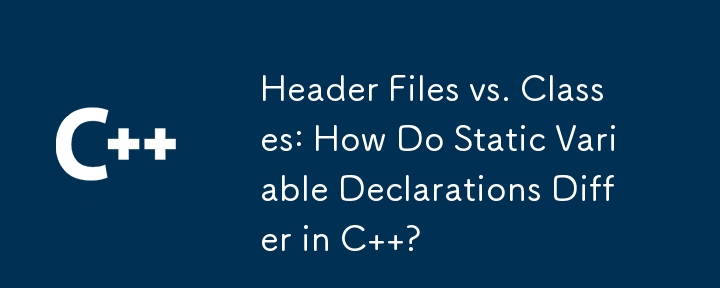Home >Backend Development >C++ >Header Files vs. Classes: How Do Static Variable Declarations Differ in C ?
Header Files vs. Classes: How Do Static Variable Declarations Differ in C ?
- Linda HamiltonOriginal
- 2024-11-25 09:32:10354browse

Understanding Static Variables: Header Files vs. Classes
When dealing with static variables in C , the distinction between those declared in header files and those declared within classes can be confusing. Here's a detailed explanation:
Scope of Static Variables in Header Files
Contrary to what some may believe, there is no separate "header file scope." When a static variable is declared in a header file, it gets copied into each source file that includes that header. Therefore, the scope of such a static variable is limited to the translation unit (the source file including the header).
Static Variables in Classes
In contrast to header file static variables, static variables declared within classes have a different meaning. They become class-level variables, meaning they are shared by all instances of that class. This is often referred to as "class scope" or "global scope" within the context of an object.
Initialization of Static Variables
When a static variable is declared within a class, it is generally initialized in a separate source file (typically the corresponding .cpp file). This is necessary to ensure that the variable is initialized exactly once.
Implications of Using Static Variables in Header Files
Declaring static variables in header files can lead to multiple instances of the same variable being created due to the copying mechanism described above. This is typically not desirable and can result in unintended behavior.
Recommended Practice
It is generally recommended to avoid using static variables in header files to indicate internal linkage. Instead, consider using anonymous namespaces to achieve the same effect without the potential risks associated with static variables in headers.
The above is the detailed content of Header Files vs. Classes: How Do Static Variable Declarations Differ in C ?. For more information, please follow other related articles on the PHP Chinese website!
Related articles
See more- C++ compilation error: A header file is referenced multiple times, how to solve it?
- C++ compilation error: wrong function parameters, how to fix it?
- C++ error: The constructor must be declared in the public area, how to deal with it?
- Process management and thread synchronization in C++
- How to deal with data splitting problems in C++ development

